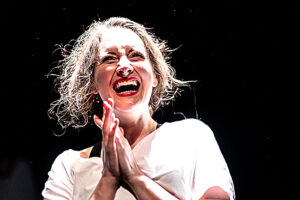
Playwright Ciara Elizabeth Smyth told David Hennessy about her play Lie Low which is onstage at the Royal Court and deals with themes such as sexual assault and PTSD.
Having earned rave reviews at the Abbey Theatre in Dublin and at the Edinburgh Fringe Festival, Ciara Elizabeth Smyth’s Lie Low is now playing on the London stage at the Royal Court.
It has come a long way since it first started at the Dublin Fringe Festival in 2020.
Playwright Enda Walsh has even called it ‘wild and hilarious’.
The story of Lie Low centres around Faye.
Her house was broken into a year ago but she is fine now.
Or more accurately she wants to be fine and if it was as simple as telling herself she was fine, she would be.
Unable to shake her insomnia, Faye enlists the help of her brother, Naoise, to try a form of exposure therapy. But Naoise has a devastating secret that’s about to come to light.
Directed by Oisín Kearney (My Left Nut), Lie Low is dark and absurd play about fear, trauma and family that offers a theatrical exploration into the human brain and its response to sexual assault.
We chatted to playwright Ciara Elizabeth Smyth just ahead of its current run.
“Thank God I’m not onstage,” Ciara tells The Irish World.
“I’m just going to be having a mild nervous breakdown in the audience.”
Is this the first time you have brought a show to London? “It is.
“This is the first time I’ve had a show on in England.
“It’s huge, I can’t believe it.
“I almost want to wait until I’m in the theatre to celebrate.
“It’s enormous. We were incredibly lucky.
“We opened it in Dublin Fringe in 2020 as a profit share because we didn’t have the opportunity to apply for funding and it was a very new thing.
“We kind of did it all ourselves so we were, as you can imagine, stressed out of our minds.
“Then we brought it to Belfast straight after Dublin Fringe where the artistic director and the executive producer of Prime Cuts Productions saw it and offered to come on board as a co-producer which has been just incredible.
“Then we went to the Abbey in Dublin for a two week run in the Peacock and then we went to Edinburgh and then (artistic director of the Royal Court) David Byrne saw it in Edinburgh on our second performance.
“I think he happened to have a free hour and he took a chance on the show so we were very lucky.”
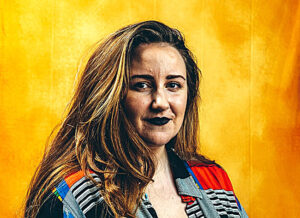
Take us back to the beginning, where did the story come from? “It probably started in 2018/ 2019 just after the waking the feminist movement in Ireland.
“But in 2020 then, there was a lot of comedians being accused of sexual harassment, sexual assault so it felt like it was in the air for a long time.
“I am good friends with this actor called Michael Patrick and he is such a gorgeous, open, friendly, sort of Labrador energy, kind of an actor.
“He’s fantastic. He’s been in the RC before and he gets a lot of comedy parts and I was interested in writing something maybe slightly more sinister for him or just kind of playing with our expectations of him a little bit.
“So he was very much folded into the idea and I did want to write something that felt sort of muddy in a way.
“That’s where it started.
“I wrote a 10 minute piece for Michael and another actor during lockdown to be performed to an audience of 10 in a festival called The Reboot Festival.
“That was the genesis of the piece but I didn’t use any of the monologue or the ten minute piece, I even kind of changed the characters in the situation for this play but that was the start of it.”

Ciara says it very much started with Michael Patrick but the actor has had some sad news since it started.
“Unfortunately he was diagnosed with motor neurone disease February last year and it has manifested physically so he’s now in a wheelchair in the space of a year.
“So he is not joining us for this iteration of Lie Low. He was in Edinburgh with us along with another actor called Thomas Finnegan.
“They were kind of role sharing because Nick had already started to display some of the symptoms of motor neuron.
“We were very sorry to lose Mick.”
There are serious themes such as sexual assault dealt with in the piece, did that come from what was in the air around 2018, 2019 as you say: #MeToo, #timesup etc?
“Definitely, I think some of my own experiences impacted on the piece.
“Now, nothing’s that’s in the piece, none of the circumstances happened to me, but I had a diagnosis of post-traumatic stress disorder brought on by a sexual assault from decades before I got that diagnosis in 2020.
“I suppose I was really fascinated by how it manifested itself physically in me and how absurd some of the behaviours and thoughts that went through my head were, and how I was aware of them being absurd but the thoughts were there, you kind of have to deal with them.
“That definitely impacted the piece, but I suppose I felt like I had seen pieces like films or plays and stories in literature about sexual assault and harassment- And I feel in theatre it’s well worn territory- so I suppose I was trying to tell a story that we’re all familiar with in a different way or from a slightly different perspective.
“I don’t know if I’ve done it right but I suppose I was trying to just make it a little bit greyer and sort of explore the damage that can occur after an event like that happens.”
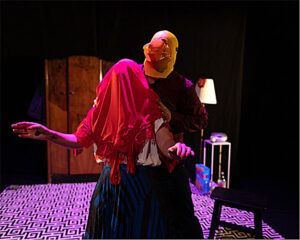
Sorry to hear you went through that..
“Thank you but some form of harassment or assault has happened to most women I know.
“It’s just interesting how ubiquitous it is and how difficult it is.
“Sometimes it (the mention of it) can be met with an eye roll which is totally fair.
“It’s kind of everywhere.
“One of the things I was trying to do with the piece is- Again, I don’t know if it’s successful or not- to sort of use comedy or surreal form or absurdity to tell the story a little bit.
“I think I found it a very interesting way in narratively.”
You mentioned your PTSD and Faye has something like it too, doesn’t she? She wants to pretend she is fine but she is far from it..
“Yeah, I think she’s at a stage in terms of the time after her experience where she just really wants it to go away.
“She really wants to be fine.
“It’s been a long time.
“It’s been a year since what happened happened and she has this quite common feeling of, ‘It could have been worse, I could have been violently assaulted, raped’.
“I think there’s a kind of a guilt there as well with the character for feeling like, ‘It could have been worse, I should get over it’.
“I think the insistence of her being fine, there’s a sincerity to it.
“She’s almost willing herself to be fine but the pain is coming out in another way, of her having insomnia which makes everything feel off kilter.
“I don’t know if you’ve ever had insomnia but it’s terrible so I feel awful for her because it’s this experience that sits with you and just goes round and round and round and repeats itself over and over again in your head.”
I was going to ask if guilt came into it. Of course there is no logic to it, she has nothing to feel guilty about but…
“Yeah, one of the really sad things is that it’s not that you’re bereft of logic.
“She’s aware that there is logic there.
“That what happened was terrible and she’s dealing with the trauma from it.
“But I don’t think the logic applies, so it’s almost worse because you’re aware of it but it doesn’t actually change how you feel.
“You’re aware that you’re not gonna be murdered every night or someone’s not going to break in to you every night but it just doesn’t change the physical effects of it on her.
“I think she’s quite wound up at the start of the play.
“She’s in front of her brother and she needs something from him but she’s trying to be calm.”
It’s like how people get burgled and never feel safe in their homes again…
“Exactly, totally, and then even if someone’s like, ‘It’s not gonna happen again’, they’re kind of like, ‘Look, it happened once so I don’t know what authority you’re speaking from, why couldn’t it happen again?’
“Because reason and logic has been sort of broken in a way.”
I’m not sure if this comes into the play but did Faye report what happened?
“That’s such an interesting question because it’s not touched on in the play and it’s kind of a purposeful thing because I suppose if you look at the statistics of assault- burglary is slightly different of course- but assaults that are reported and not reported.
“Even the ones that are reported that carry through to a conviction- You’re talking about a sliver, a sliver of percentages.
“In my experience I felt like I’d been treated quite well by authority but there was nothing that could be done.
“Some people are dissuaded from reporting because of the stress that it brings.
“It’s not something the play touches on because it deals with this situation, that’s almost beside the point.
“Reporting isn’t going to do anything.”
Faye wants to leave it behind..
“She wants to get on with it, totally.
“I feel like she’s at the end of her tether and she’s latched on to this idea that if she can just do this exercise with her brother, that it’ll work and it’ll all be okay.
“But it feels almost like her last attempt.
“She’s tried a lot of things, I think.”
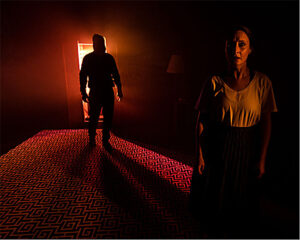
You were originally more of an actor and then when you started writing, for a long time you didn’t show anyone. Isn’t that right? So you were a bit late in the game in a way..
“I think that’s pretty fair to say.
“I had been acting since I was about five.
“I was kind of sent to speech and drama.
“I was very, very shy and had a speech impediment so it was like a confidence building thing, but I just loved it and my nanny was an actor so I had been in and around theatre all my life.
“I had been writing but I kind of never knew the avenue because you write a play and then you’re kind of like, ‘What do I do with it?’
“I worked in the Gate Theatre where one of my roles was reading the scripts that were unsolicited submissions.
“I was amazed at these teachers and civil servants and plumbers sending in whole five act plays.
“I was like, ‘That’s just incredible, Why shouldn’t I try showing someone something I wrote?’
“So I sent a piece in to Scene + Heard which is a spectacular work in progress festival in Dublin and put it on myself.
“But my first play in the Dublin Fringe Festival, the first sort of full play, was when I was 30.
“I had just passed my 30th birthday so I’m like an old hag now at this stage.”
Still only 36, Ciara doesn’t mean this.
“I do feel like I learned on the job in a way because I was just putting scenes on stage and seeing how people reacted: How audience reacted, how actors reacted, directors, creatives…
“I was really very lucky.”
Another thing was, with your acting, so many of the parts were someone’s girlfriend etc.
Is it up to women to tell women’ stories?
“Yeah, I suppose so not that I don’t think anyone of any other gender can tell stories about women.
“Everybody’s personal experiences are very unique.
“So in a way, there’s always going to be a benefit of anybody writing.
“But I grew up in Celtic Tiger Ireland and that was not a progressive place particularly in a convent school in Dublin.
“If you grew up the same time as me, I’m sure you have an inkling as to the way we were socialised.
“And, I felt, how much responsibility was placed on young girls to behave in a certain way.
“The school I went to now has actually gone very progressive but when I was there, it was not so.
“Being gay was a really, really shameful thing.
“Being fat was a really shameful thing.
“There was a lot of shame knocking around at that time and I think there’s a mirroring of that in theatre.
“There’s a lot of fantastic parts for men, not that there are no fantastic parts for women but the ratio of men to women, male to female parts was totally out of whack.
“I did find myself as an actor being jealous of the complex and comedic male parts and often they didn’t have really anything to do with their romantic or familial relationships.
“Sometimes they did, sometimes they didn’t but they had a kind of freedom to them that I didn’t feel was as readily available for female parts.
“Then it was really nice to start writing and trying to write the parts that I was looking for.”
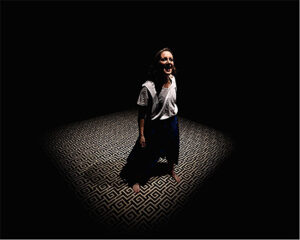
Is society in a better place for women now for the movements we have had such as MeToo, etc?
“I think that’s a really hard question to gauge and I can almost only speak for myself.
“Certainly in my working life the recognition of the behaviour that was perpetrated previously it’s been felt.
“I feel like people in the theatre industry in Ireland have really made an effort to make sure everybody feels safe and that everybody has recourse if they have something to complain about.
“I think that was one of the biggest problems: That the industry is such a large percentage of freelancers working for companies that maybe don’t have an appointed HR person or previously didn’t have procedures to deal with bullying or harassment.
“I really feel like the theatres and the companies in Ireland, as I say, have put measures in place.
“Now, I couldn’t possibly speak for that behaviour being eradicated completely. I sincerely doubt it but I feel certainly in my working life like it’s a safer place.
“It’s interesting because it was like people were asleep to a certain thing or a certain person or a certain behaviour.
“Everybody was aware it happened and they were like, ‘Oh, it’s terrible…’
“But a lot of people were allowed to continue to remain in their positions.
“I feel like the most positive change has been that there is recourse for a complaint or there’s avenues to go to and procedures have been set up.”
Just before I let you go and back to the play I bet you couldn’t have foreseen it going all the way to London when you started doing it all yourself back in 2020…
“I literally could not in a month of Sundays have guessed or hoped.
“I was in the Royal Court a couple of years ago, just as a punter and I was almost just delighted that they let me buy tickets.
“I really can’t believe it.
“It’s surreal.”
Lie Low is at the Royal Court until 8 June.
For more information, click here.


